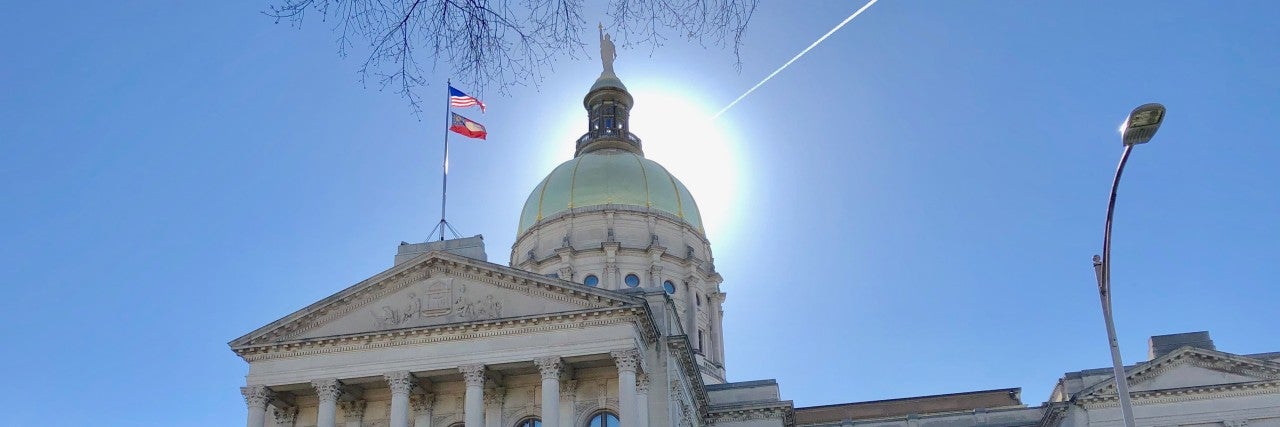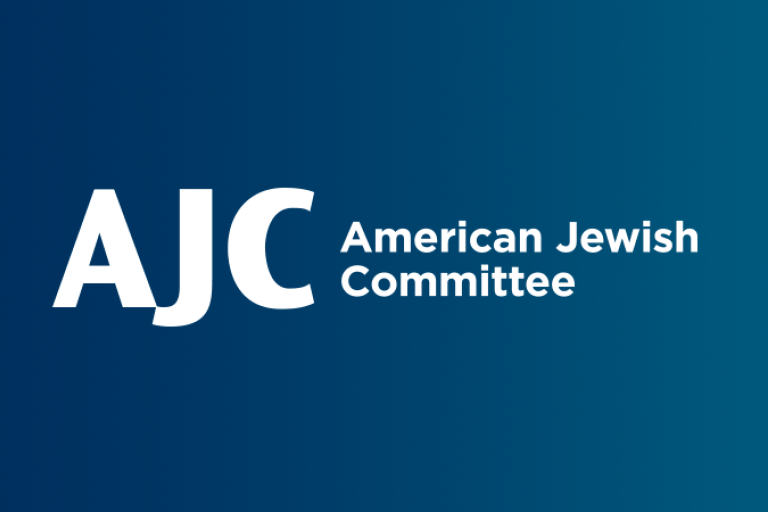AJC Atlanta is happy to share that H.B.30 passed the General Assembly and was signed into law on January 31, 2024. Read below to understand the importance of H.B.30 and how it will impact our state.
Why Do We Need to Address Antisemitism?
Antisemitism is at crisis levels and getting worse, including in Georgia. While Jews only comprise about 2% of the U.S. population, according to the FBI, they suffer approximately 60% of all religiously-motivated hate crimes. Antisemitism has been increasing every year. In 2022, antisemitic incidents increased by 63% in Georgia. And, since the October 7, 2023 Hamas terrorist attack on Israel, antisemitism has surged nearly 350% in the United States alone. The impact of this hate is real—78% of American Jews who heard anything about Hamas’ attack feel less safe and 43% of them have actually changed their behavior out of fear.
Despite the demonstrable prevalence of antisemitic incidents, one-third of all Americans say they have never even heard the word antisemitism, or at the very least, do not know what it means. That means that many Georgians, including public officials, may not know what is considered antisemitic or not when an incident occurs.
Read more:
- AJC's State of Antisemitism in America Report
- 10 Tough Questions on Antisemitism Explained
- Understanding the Origins of Antisemitism
- Antisemitism in America is Becoming Like Europe
Why Do We Need to Define Antisemitism?
We cannot fight antisemitism if public officials cannot recognize and define it. The bill is necessary because Jewish identity is multifaceted, incorporating aspects of religion, culture, national origin, and ethnicity. Without a standard definition, it is easy for antisemites to hide behind ambiguity, committing antisemitic acts, and then claiming it was not antisemitism because it was not based on a particular characteristic. Similarly, without a definition, public officials who are not familiar with antisemitism may not recognize an incident for what it is and therefore not adequately respond.
Additionally, having an officially-recognized definition can serve as a vital educational tool, particularly for the next generation. Approximately 38% of Americans aged 18-29 don’t think Jews experience discrimination and a quarter don’t believe that hate crimes against Jews are a serious problem. Shockingly, 46% of these young Americans don’t believe denying the Holocaust is antisemitic and a one in five think it was a myth. This lack of awareness and knowledge only allows antisemitism to accelerate.
Read more:
- AJC's Translate Hate Glossary
- A Guide to Recognizing When Anti-Israel Actions Become Antisemitic
- 7 Ways Some Recent Anti-Israel Protests Have Spread Antisemitism
- Forms of Antisemitism
- Everything You Need to Know About Holocaust Denial & Distortion
Why the IHRA Definition?
The International Holocaust Remembrance Alliance (IHRA) Definition of Antisemitism is the world consensus. It has already been adopted by over 1,100 separate governments, NGOs, and other key institutions. The IHRA Definition has been adopted and used by various departments of the federal government and both Republican and Democratic presidential administrations. It has already been adopted by 31 states and the District of Columbia, either through proclamation, executive order, or legislation. This specific definition also has broad support from almost every major American Jewish organization.
Read more:
- 5 Common Questions About the IHRA Definition of Antisemitism
- Adoption of the Definition in the U.S.
- Adopting of the Definition Internationally
Why does H.B.30 only reference the IHRA Definition, and not include the full text in the bill itself?
H.B.30 references the IHRA Definition of Antisemitism from May 26, 2016 to ensure that the full, recognized definition is what is actually adopted and utilized. This reduces the likelihood that the definition will be improperly modified, which would alter its meaning and efficacy. Adopting the IHRA Definition by reference also protects its uniformity, guaranteeing Georgia is aligned with the U.S. government and other U.S. states, all of whom have similarly embraced the IHRA Definition by reference. Additionally, there is significant precedent for referencing a third-party definition in Georgia code. State law already refers to national associations and federal regulations for certain rules, all without problems.
What adoption of the IHRA Definition through H.B.30 does:
Ensures proper assessment and response to criminal conduct and discriminatory incidents motivated by antisemitism.
- Helps to implement valid monitoring and enforcement.
- Supports officials in applying the state’s existing laws protecting against unlawful conduct toward Jews, therefore strengthening Georgia’s hate crimes law.
- Ensures that incidents of antisemitic hate and bias are addressed equally under the law compared to other types of hate and bias.
- Assists public institutions to stay in compliance with federal civil rights obligations.
- Symbolizes that antisemitism will not be tolerated or accepted in Georgia.
Valid monitoring, informed analysis, and effective policy-making all require uniform definitions. Georgia has a responsibility to protect their citizens from acts of hate and bigotry motivated by discriminatory animus—including antisemitism—and must be given the tools to do so. This bill reaffirms that hate has no place in our state.
What adoption of the IHRA Definition through H.B.30 does NOT do:
Does not revise any existing anti-discrimination policies; it simply defines a term and ensures that existing laws will be consistently applied.
- Does not limit or chill freedom of speech or expression. With this bill, anyone can still say whatever they want, however hateful, about Jews or Israel. Antisemitic and anti-Israel speech would remain constitutionally protected.
- The bill explicitly states, “Nothing contained in this bill is to be construed to diminish or infringe upon any right protected under the First Amendment to the United States Constitution.”
- This definition would only be used when government agencies are responding to an incident that is already illegal (such as unlawful discrimination or acts of vandalism or assault). It simply assists officials in determining intent.
- Does not create any new protected class, enhance punishment, regulate, or restrict academic freedom. It merely provides guidance on how to apply existing laws.
- Does not provide any special treatment for Jews. This bill is not about establishing Jewish exceptionalism. It is about providing clarity to what is defined as antisemitism.
The importance of having a clear definition is not unique to antisemitism. Should other groups facing hateful bias find the need to implement a uniform definition to clarify what is and is not bias-motivated conduct, such concerns should be similarly addressed.
Who Supports H.B.30?
H.B.30 is supported by a near-unanimous majority of the Georgia Jewish community and other communities who recognize the dangers of antisemitism. While the Jewish community is not a monolith and holds diverse opinions on many issues, few issues exist that the Jewish community agrees with more than the need to adopt IHRA. Here are just some of the local organizations supporting the bill, representing the vast majority of Jewish Georgians and members of the non-Jewish community:
- Adas Yeshurun Synagogue, Augusta
- Ahavath Achim Synagogue, Atlanta
- Alpha Epsilon Pi - Southeast Region
- American Jewish Committee (AJC) Atlanta
- Anti-Defamation League (ADL) Southeast
- Atlanta Area Initiative Against Antisemitism
- Atlanta Israel Coalition
- Atlanta Jewish Academy
- Atlanta Jewish Community Relations Council (JCRC)
- Atlanta Jews of Color Council
- Augusta Jewish Community Center
- Augusta Jewish Federation
- B'nai B'rith International - Atlanta Lodge
- Breman Jewish Heritage Museum, Atlanta
- Camp Ramah Darom, Clayton
- Chabad at Emory University
- Chabad Buckhead & Brookhaven
- Chabad Decatur
- Chabad Enrichment Center of Gwinnett
- Chabad Intown, Atlanta
- Chabad Israeli Center, Atlanta
- Chabad of Athens-UGA
- Chabad of Augusta
- Chabad of Cobb
- Chabad of Dunwoody
- Chabad of Hall County
- Chabad of North Fulton
- Chabad of Peachtree City
- Chabad of Rural Georgia
- Chabad of Savannah
- Chabad of Smyrna-Vinings
- Chabad of Toco Hills
- Christians United for Israel
- Congregation Agudath Achim, Savannah
- Congregation Anshi S'Fard, Atlanta
- Congregation Ariel, Dunwoody
- Congregation B'nai Torah, Sandy Springs
- Congregation Beth Israel, Cumming
- Congregation Beth Jacob, Atlanta
- Congregation Beth Shalom, Dunwoody
- Congregation Beth Tefillah, Sandy Springs
- Congregation Children of Israel, Athens
- Congregation Children of Israel, Augusta
- Congregation Dor Tamid, Johns Creek
- Congregation Etz Chaim, Marietta
- Congregation Gesher L'Torah, Alpharetta
- Congregation Mickve Israel, Savannah
- Congregation Ner Tamid, Marietta
- Congregation Ohr HaTorah, Atlanta
- Congregation Or Hadash, Sandy Springs
- Congregation Or VeShalom, Atlanta
- Congregation Sha'arey Israel, Macon
- Congregation Shaarei Shamayim, Atlanta
- Congregation Shearith Israel, Atlanta
- Emory Hillel, Atlanta
- Eternal Life-HemShech, Atlanta
- Georgia Tech Hillel, Atlanta
- Hadassah, Southeastern Region
- Hillel at Agnes Scott College, Decatur
- Hillel at Georgia College, Milledgeville
- Hillel at Georgia Southern University, Statesboro
- Hillel at Georgia State University, Atlanta
- Hillel at Kennesaw State University
- HinduACTion
- HiPAC: Hindus of Georgia PAC, Marietta
- In The City Camps, Atlanta
- Israeli-American Coalition for Action
- Israeli-American Council, Atlanta Region
- Jewish Educational Alliance, Savannah
- Jewish Educational Loan Fund (JELF), Atlanta
- Jewish Family & Career Services (JF&CS), Atlanta
- Jewish Federation of Greater Atlanta
- Jewish Fertility Foundation, Atlanta
- Jewish Home Life Communities, Atlanta
- Jewish Interest Free Loan of Atlanta
- Jewish Moms of Atlanta
- Jewish National Fund (JNF) Atlanta Region
- Jewish Student Union of Atlanta
- Jewish Women’s Fund of Atlanta
- Kennesaw Chabad Jewish Center
- Kesher Torah Synagogue, Sandy Springs
- Marcus Jewish Community Center, Atlanta
- Mercer University Jewish Student Union, Macon
- National Black Empowerment Council
- National Council for Synagogue Youth Atlanta Chapter
- National Jewish Advocacy Center
- Nediv Lev, Atlanta
- Ner Hamizrach, Atlanta
- Neranenah Concert & Culture Series, Atlanta
- Netzach Israel, Atlanta
- New Toco Shul, Atlanta
- Oglethorpe Hillel, Brookhaven
- Orthodox Union - Atlanta Chapter
- Savannah Jewish Federation
- SCAD Hillel, Savannah
- Shearith Israel Synagogue, Atlanta
- Simon Wiesenthal Center Southern Region
- StandWithUs Southeast
- Students Supporting Israel
- Temple Beth Israel, Macon
- Temple Beth Tikvah, Roswell
- Temple Emanu-El, Sandy Springs
- Temple Kehillat Chaim, Roswell
- Temple Kol Emeth, Marietta
- Temple Sinai, Atlanta
- The Epstein School, Sandy Springs
- The Kehilla in Sandy Springs
- The Temple, Atlanta
- The Weber School, Sandy Springs
- Torah Day School of Atlanta
- Tzedek Georgia
- UGA Hillel, Athens
- Uttar Pradesh North America Association, Alpharetta
- World Jewish Congress
- Zachor Shoa

